|
|
|
Sort Order |
|
|
|
Items / Page
|
|
|
|
|
|
|
| Srl | Item |
| 1 |
ID:
171536
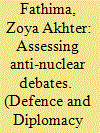

|
|
|
| 2 |
ID:
047560
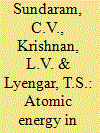

|
|
|
|
|
| Publication |
New Delhi, Department of Atomic Energy, 1998.
|
| Description |
277p.
|
|
|
|
|
|
|
|
|
|
|
|
Copies: C:1/I:0,R:0,Q:0
Circulation
| Accession# | Call# | Current Location | Status | Policy | Location |
| 043185 | 333.7924/SUN 043185 | Main | On Shelf | General | |
|
|
|
|
| 3 |
ID:
171539
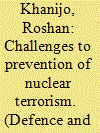

|
|
|
| 4 |
ID:
105660


|
|
|
| 5 |
ID:
144656
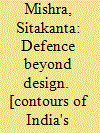

|
|
|
|
|
| Publication |
New Delhi, KW Publishers Pvt Ltd, 2016.
|
| Description |
xix, 307p.hbk
|
| Standard Number |
9789383649884
|
|
|
|
|
|
|
|
|
|
|
|
Copies: C:1/I:0,R:0,Q:0
Circulation
| Accession# | Call# | Current Location | Status | Policy | Location |
| 058636 | 355.8251190954/MIS 058636 | Main | On Shelf | General | |
|
|
|
|
| 6 |
ID:
186102


|
|
|
|
|
| Summary/Abstract |
After the Fukushima nuclear meltdown, the Angela Merkel government in Germany officially announced its decision to permanently shut down all of its seventeen nuclear reactors. In closer proximity to Fukushima, the Lee Myung-bak government in South Korea expanded its nuclear energy program with specific plans to construct more nuclear reactors in various locations and pursued more export opportunities. It was only in 2017 that the South Korean government, under President Moon Jae-in, announced a gradual phase-out of nuclear power plants in South Korea. What explains the contrasting paths of the German and South Korean nuclear energy programs in the immediate aftermath of the Fukushima nuclear disaster? Why did the same external shock prompt sudden policy reversal in Germany while it took six more years for South Korea to turn its course? While existing studies are helpful in accounting for the rise of particular energy policies, they are insufficient for explaining the causes and specific timing of major policy reversals in the face of external crises. Building upon the literature on political opportunity structures, this article argues that the emergence of new political opportunities and the shift in political framing with respect to nuclear energy caused nuclear phase-out in both countries. A closer look at the two national cases offers an opportunity to delineate the domestic political process of nuclear energy policymaking and evaluate the role of exogenous shocks, such as a major nuclear disaster, in shifting political opportunity structure and reshaping the perceptions of energy security and political risks.
|
|
|
|
|
|
|
|
|
|
|
|
|
|
|
|
| 7 |
ID:
107831
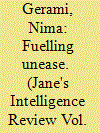

|
|
|
| 8 |
ID:
091929


|
|
|
| 9 |
ID:
110793
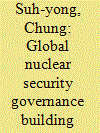

|
|
|
|
|
| Publication |
2012.
|
| Summary/Abstract |
This paper addresses the issues on nuclear security governance building through
the Nuclear Security Summit. Given the increased threat of nuclear terrorism by
non-state actors, the current global mechanism addressing nuclear security has
revealed serious limitations. Despite various legally binding instruments-such as the
Convention on the Physical Protection of Nuclear Material (CPPNM), the International
Convention for the Suppression of Acts of Nuclear Terrorism (ICSANT), the UN
Security Council Resolution 1540 and other non-legally-binding instruments-global
efforts to address nuclear terrorism have faced serious challenges to their effectiveness.
As a result, after U.S. President Obama's speech in 2009 in Prague, the first Nuclear
Security Summit Meeting was successfully held in Washington, D.C. Based on its
success, the second Nuclear Security Summit Meeting is scheduled to be held in
March 2012 in Seoul, Korea. In addition to the ongoing issues, the Seoul Meeting
will deal with new issues such as nuclear safety in reflection of the 2011 Fukushima
accident. The meeting may also consider discussions on other important issues
such as the framework agreement, involvement of relevant stakeholders, further
institutionalization of the Nuclear Security Summit Meeting and sustainable financing
as long-term agendas. Ultimately, this process will reinforce the effectiveness of the
global efforts to tackle nuclear terrorism and other related issues.
|
|
|
|
|
|
|
|
|
|
|
|
|
|
|
|
| 10 |
ID:
014368
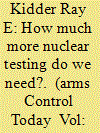

|
|
|
|
|
| Publication |
Sept 1992.
|
| Description |
11-14
|
|
|
|
|
|
|
|
|
|
|
|
|
|
|
|
| 11 |
ID:
046276


|
|
|
|
|
| Publication |
Manchester, Manchester University Press, 2003.
|
| Description |
xii, 204p.
|
| Series |
Issues in environmental politics
|
| Standard Number |
0719063868
|
|
|
|
|
|
|
|
|
|
|
|
Copies: C:1/I:0,R:0,Q:0
Circulation
| Accession# | Call# | Current Location | Status | Policy | Location |
| 046512 | 344.046/HON 046512 | Main | On Shelf | General | |
|
|
|
|
| 12 |
ID:
055390
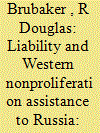

|
|
|
| 13 |
ID:
042587


|
|
|
|
|
| Publication |
Baltimore, Resources for the future, 1974.
|
| Description |
xiv, 271p.
|
| Standard Number |
0801815320
|
|
|
|
|
|
|
|
|
|
|
|
Copies: C:1/I:0,R:0,Q:0
Circulation
| Accession# | Call# | Current Location | Status | Policy | Location |
| 021864 | 333.7924/COC 021864 | Main | On Shelf | General | |
|
|
|
|
| 14 |
ID:
055725
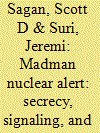

|
|
|
| 15 |
ID:
140974


|
|
|
|
|
| Summary/Abstract |
Pakistan, the fastest growing nuclear weapon state in the world, has established over the last decade a nuclear management system it holds to be “foolproof.” Despite the explosion of radical groups challenging the writ of the state, it dismisses concerns by critics that its nuclear weapons are not safe and secure as “preposterous” and an attempt to “malign” the state. This article examines Pakistan's nuclear management system in four functional areas: command-and-control, physical security, nuclear surety, and doctrine. It describes what is publicly known in each area, identifies areas of omission and inadequacy in each one, and examines several premises of the nuclear program the author considers to be unfounded. Comparing these deficiencies in Pakistan's nuclear management system to the current problems plaguing the US nuclear management system, the author concludes that complacency and unfounded confidence in the efficacy of such programs, if not addressed and corrected, could lead to a future nuclear catastrophe in South Asia.
|
|
|
|
|
|
|
|
|
|
|
|
|
|
|
|
| 16 |
ID:
110993
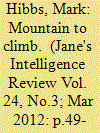

|
|
|
|
|
| Publication |
2012.
|
| Summary/Abstract |
The Second of its kind, the Seoul summit aims to reach consensus on security nuclear materials against their use by militants, however, despite some progress in 2010, agreeement may be harder to find this time.
|
|
|
|
|
|
|
|
|
|
|
|
|
|
|
|
| 17 |
ID:
114435


|
|
|
|
|
| Publication |
2012.
|
| Summary/Abstract |
The funding of international nuclear risk mitigation is ad hoc, voluntary, and unpredictable, offering no transparent explanation of who is financially responsible for the task or why. Among many non-nuclear-armed states, this exacerbates a sense of injustice surrounding what they see as a discriminatory nuclear regime. The resulting erosion of the regime's legitimacy undermines support for efforts to prevent nuclear weapons dissemination and terrorism. This article proposes a transparent, equitable "nuclear-user-pays" system as a logical means of reversing this trend. This system envisions states contributing financially to international efforts to mitigate nuclear risks at a level relative to the degree of nuclear risks created by each state. "National nuclear risk factors" would be calculated by tabulating the risks associated with each state's civilian and military nuclear activities, as well as advanced dual-use and nuclear-capable missile activities, multiplying the severity of each risk by the probability of it occurring, and combining these results. A nuclear-user-pays model would create financial incentives for national and corporate nuclear risk mitigation, boost legitimacy and support for nuclear control efforts among non-nuclear-armed states, assist in preventing nuclear weapons dissemination and terrorism, and advance nuclear disarmament by helping progressively devalue nuclear weapons.
|
|
|
|
|
|
|
|
|
|
|
|
|
|
|
|
| 18 |
ID:
001624


|
|
|
|
|
| Publication |
Dordrecht, Kluwer Academic Press, 1998.
|
| Description |
xx, 378p.
|
| Standard Number |
0792351916
|
|
|
|
|
|
|
|
|
|
|
|
Copies: C:1/I:0,R:0,Q:0
Circulation
| Accession# | Call# | Current Location | Status | Policy | Location |
| 041168 | 363.1799/PED 041168 | Main | On Shelf | General | |
|
|
|
|
| 19 |
ID:
149952


|
|
|
|
|
| Summary/Abstract |
This article reviews the current status and future prospects of commercial nuclear electric power, with emphasis on issues of safety, physical security, proliferation, and economics. Discussions of these issues are presented separately for the current operating fleet, for new reactor designs similar in size to the current fleet, and for prospective new reactors of substantially smaller size. This article also discusses the issue of expansion of commercial nuclear power into new countries. The article concludes with recommendations, related both to technical issues and policy considerations. The major implications for policy are that although the level of safety and security achieved in today's operating reactor fleet worldwide is considered broadly acceptable, some advanced designs now under development potentially offer demonstrably safer performance, and may offer improved financial performance also. Management and safety culture are vital attributes for achieving adequate safety and security, as are a strong political culture that includes an absence of corruption, an independent regulatory authority, and a separation of nuclear operation from day-to-day politics. In some countries that are now considering a nuclear-power program for the first time, careful attention to these attributes will be essential for success.
|
|
|
|
|
|
|
|
|
|
|
|
|
|
|
|
| 20 |
ID:
128323
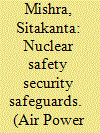

|
|
|
|
|
| Publication |
2013.
|
| Summary/Abstract |
Since its inception, nuclear technology has evoked a sense of zeal as well as awe because of its immense constructive and destructive potential. By now, the world has come a long way, experiencing both: around 540 nuclear reactors operating in countries producing 372,000 MWe (13.5 percent of the world`s electricity), radioactive materials used in many sectors enriching human life; on the other hand, two nuclear bomb have been used in war and around 19,000 more are stockpiled; during the same time, three major nuclear accidents occurred, resulting in some human suffering, and misuse of nuclear material by non-states actors is widely apprehended. Therefore, the balance sheet may be argued to be mixed, implying that we succeeded as much we failed with nuclear technology. After the Fukushima nuclear disaster, what would be the fate of nuclear technology or which direction the nuclear energy discourse will move in has been a matter of speculation. This study, premised on the assumption that nuclear technology or nuclear energy cannot be ignored as it has an edge over other for a better management paradigm by looking beyond the design basis threats to address inherent loopholes. Deconstructing the real and assumed threats (accident, misuse, and terror), this study prescribes a coherent and integrated strategy devoid of political and social panic.
|
|
|
|
|
|
|
|
|
|
|
|
|
|
|
|
|
|
|
|
|